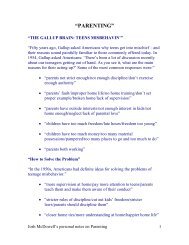Pdf Copy of Orthodoxy, by G.K. Chesterton - Christ United Methodist ...
Pdf Copy of Orthodoxy, by G.K. Chesterton - Christ United Methodist ...
Pdf Copy of Orthodoxy, by G.K. Chesterton - Christ United Methodist ...
You also want an ePaper? Increase the reach of your titles
YUMPU automatically turns print PDFs into web optimized ePapers that Google loves.
9/ 27/ 12 The Pr oject G ut enber g eBook <strong>of</strong> O r t hodoxy, G . K. Chest er t on<br />
www. gut enber g. or g/ f iles/ 16769/ 16769- h/ 16769- h. ht m<br />
speck <strong>of</strong> spiritualism or miracle. Poor Mr. McCabe is not allowed to retain even the tiniest<br />
imp, though it might be hiding in a pimpernel. The <strong>Christ</strong>ian admits that the universe is<br />
manifold and even miscellaneous, just as a sane man knows that he is complex. The sane<br />
man knows that he has a touch <strong>of</strong> the beast, a touch <strong>of</strong> the devil, a touch <strong>of</strong> the saint, a touch<br />
<strong>of</strong> the citizen. Nay, the really sane man knows that he has a touch <strong>of</strong> the madman. But the<br />
materialist's world is quite simple and solid, just as the madman is quite sure he is sane. The<br />
materialist is sure that history has been simply and solely a chain <strong>of</strong> causation, just as the<br />
interesting person before mentioned is quite sure that he is simply and solely a chicken.<br />
Materialists and madmen never have doubts.<br />
Spiritual doctrines do not actually limit the mind as do materialistic denials. Even if I believe<br />
in immortality I need not think about it. But if I disbelieve in immortality I must not think<br />
about it. In the first case the road is open and I can go as far as I like; in the second the road<br />
is shut. But the case is even stronger, and the parallel with madness is yet more strange. For<br />
it was our case against the exhaustive and logical theory <strong>of</strong> the lunatic that, right or wrong, it<br />
gradually destroyed his humanity. Now it is the charge against the main deductions <strong>of</strong> the<br />
materialist that, right or wrong, they gradually destroy his humanity; I do not mean only<br />
kindness, I mean hope, courage, poetry, initiative, all that is human. For instance, when<br />
materialism leads men to complete fatalism (as it generally does), it is quite idle to pretend<br />
that it is in any sense a liberating force. It is absurd to say that you are especially advancing<br />
freedom when you only use free thought to destroy free will. The determinists come to bind,<br />
not to loose. They may well call their law the "chain" <strong>of</strong> causation. It is the worst chain that<br />
ever fettered a human being. You may use the language <strong>of</strong> liberty, if you like, about<br />
materialistic teaching, but it is obvious that this is just as inapplicable to it as a whole as the<br />
same language when applied to a man locked up in a mad-house. You may say, if you like,<br />
that the man is free to think himself a poached egg. But it is surely a more massive and<br />
important fact that if he is a poached egg he is not free to eat, drink, sleep, walk, or smoke a<br />
cigarette. Similarly you may say, if you like, that the bold determinist speculator is free to<br />
disbelieve in the reality <strong>of</strong> the will. But it is a much more massive and important fact that he is<br />
not free to praise, to curse, to thank, to justify, to urge, to punish, to resist temptations, to<br />
incite mobs, to make New Year resolutions, to pardon sinners, to rebuke tyrants, or even to<br />
say "thank you" for the mustard.<br />
In passing from this subject I may note that there is a queer fallacy to the effect that<br />
materialistic fatalism is in some way favourable to mercy, to the abolition <strong>of</strong> cruel<br />
punishments or punishments <strong>of</strong> any kind. This is startlingly the reverse <strong>of</strong> the truth. It is quite<br />
tenable that the doctrine <strong>of</strong> necessity makes no difference at all; that it leaves the flogger<br />
flogging and the kind friend exhorting as before. But obviously if it stops either <strong>of</strong> them it<br />
stops the kind exhortation. That the sins are inevitable does not prevent punishment; if it<br />
prevents anything it prevents persuasion. Determinism is quite as likely to lead to cruelty as it<br />
is certain to lead to cowardice. Determinism is not inconsistent with the cruel treatment <strong>of</strong><br />
criminals. What it is (perhaps) inconsistent with is the generous treatment <strong>of</strong> criminals; with<br />
any appeal to their better feelings or encouragement in their moral struggle. The determinist<br />
does not believe in appealing to the will, but he does believe in changing the environment. He<br />
must not say to the sinner, "Go and sin no more," because the sinner cannot help it. But he<br />
can put him in boiling oil; for boiling oil is an environment. Considered as a figure, therefore,<br />
12/ 100





